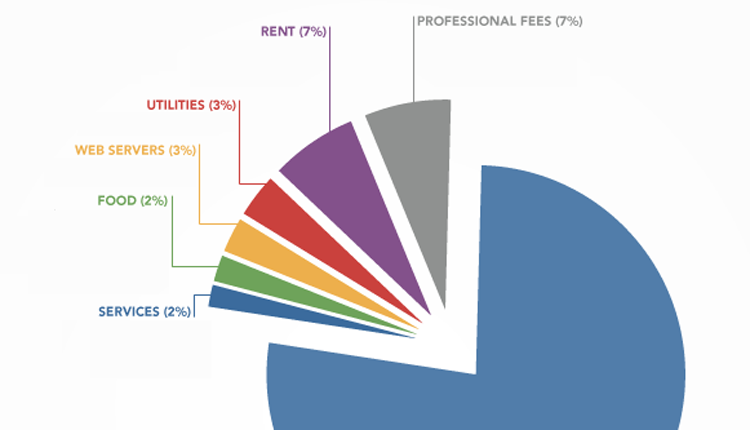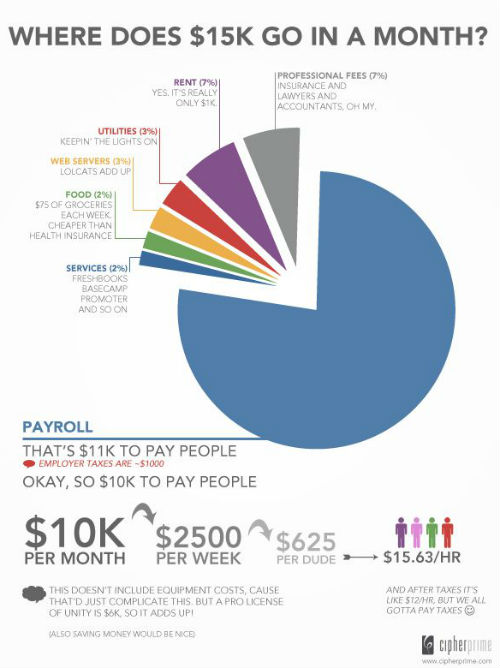What it takes to finance your indie game

NixiePixel sheds light on the cost challenges limiting indies
Niki Allen, a.k.a NixiePixel, is a co-founder at Equiti Games
Funding games is no easy task. Despite our best efforts, we can’t genetically engineer a tree to grow money, nor can we kidnap Peter Dinklage (in case the rumors about the Lannisters end up being true), so we’re stuck with the old ways of making friends and asking them for help.
My point is don’t try to blast off into space before you’ve learned how to walk.
From the get-go, developing a game imposes a multitude of costs with financing being just one of them, albeit the hardest to overcome initially.
Depending on the scope of the project, seed capital will likely determine the height of your first hurdle. You can’t develop a game if it means you may lose your house: you probably can’t code under a bridge, and I wouldn’t eat money even if it was fried and dunked in hot sauce.
My point is don’t try to blast off into space before you’ve learned how to walk.
Let’s start by taking a look at this pie chart (shoutout Cipher Prime) that gives us a map of the financial atmosphere game start-ups have to work through to get off the ground.
Cost breakdown
The current situation presents a catch-22 where you need to spend money to make money.

Technology/Tools: You can’t run a game without an engine, and both flat rate and percentage-based fees for game engines can be exorbitant.
3D model editing software costs between hundreds and thousands of dollars for an individual license, and private code repositories cost money as well.
New Hires: After successfully seeding the project, you’ll eventually have to hire more people, unless you can manage the responsibilities of a programmer, designer, artist, musician and marketer all at once.
These initial hiring costs are what prevent most average indie games from ever taking off, and while it may seem enticing to use company shares to cover hiring expenses at first, it can end up costing you more in the long run as you’re not just hiring employees but shareholders.
IP/Licensing: After spending months guzzling money to pay for getting your game development underway, you’ll accrue further unavoidably steep costs to license music, graphics, and trademarking your intellectual property. Otherwise, someone can rip the brand you’ve been making from right from under your own feet.
Marketing: Just when all these debts have sunken deep enough to where your dreams are being crushed under the Marianas Trench, Billy Mays will then sardonically pop out and say, “But wait, there’s more!” That is, you’ll need marketers and public relations experts! This useful bunch sends your press releases, manages your (hopefully) growing community, and handles the business side of things while you’re coding your dreams into reality.
The trick is that people are fickle and have to be wooed using a combination of notes and chords played in the right key. Otherwise your voice will be lost to the cacophony of modern day Internet advertising. This ensemble is best left to the Mozarts and Herbie Hancocks: the marketeers. And sure, you might not like ads – we all know some of them are absolutely atrocious – but they exist because they work to drive qualified traffic to your product. While advertising can be done at a limited scale, any developer that wants to scale their game will need to have a battlechest ready to attract new clients, and even just hiring an influencer to promote your project to a target audience can easily come out to five figures. Success is an expense in and of itself so don’t be shy.
Money, money, money
Now, if it costs so much you may be wondering, how the hell are so many indie games being developed? Well, turns out that devs have friends, even if they don’t know it.
As your game development cycle moves through its various stages of development, more and more options will open up for funding, meaning the hardest task is often gathering enough seed capital to start off with.
Making a list that illustrates all the options of all stages would result in this article becoming the length of a book. For convenience’s sake I’ll just cover what I think are the best options available at different stages. Some of them might be harder to achieve from the start, but they are within reach, and that’s what matters in the end: games are dreams that can and do come true.
Funding Sources

Publishers: When you think of ‘publisher’, traditionally you’ll think of losing creative control and selling your soul to the Devil (or Moe) himself.
However, there are now a whole new breed of “indie” publishers, such as TinyBuild and Devolver, that are fighting for the little guy.
They offer a suite of support in loads of other ways, rather than blowing most of your budget on marketing trying to gain exposure.
Governments and Grants: While governments are busy taxing the air we breathe, they also fork out some serious coin to game developers. Some governments even fund game journalism. If you’re lucky enough to live in Canada or many countries in Europe and your pixelated platform or whimsical action-adventure meets the relevant criteria, you can receive a grant after going through an application approval process. Many euro-inspired private foundations are now following suit.
Private Loans: This shares the same advantages as using your own money. Friends and family usually aren’t interested in making a profit and you’ll also retain creative control. But yet again feasibility is the killer for this option: not everyone has friends or a family with boatloads of cash lying about.
Business Loans: Yes, we’re now getting into scary territory. Business loans take a long time, they’re hard to get, and interest rates can rival credit cards. If you’re still in your pre-revenue phase, odds are you’ll not be getting one. IF you do manage to get one, the cash infusion should fund the entire development cycle on its own. You’ll be very much pressed to finish your product in a timely manner, but you’ll still retain full control of the development process.

Crowdfunding: The internet is a cynical place and trust is a rare commodity, and if you’re developing a game, the trust you’re given is even lower thanks to the actions of some people that shall remain unnamed (cough).
Nevertheless, crowdfunding is still very much a viable option if your game manages to garner enough interest. But be wary of the promises you make to your backers, and doubly wary of extras like shirts and promotional materials that add even more expenses. Some games raised millions and ended up with almost no extra funding after transaction fees and other compounding expenses.
Your Own Money: Well, let’s be real, this is a no-brainer. It might not be the most feasible but it’s by far the best. You’re not sacrificing any control whatsoever. If you have the skills needed to start developing a game, you should also have the skills to be able to fund the early days of development on your own. It’ll be a lot easier to get further funding if you can present something tangible, and doing so allows you to retain a significant amount of control.
Decentralize This: One of the largest taxes levied when any game goes to market is the extortionate fee publishers pay distributors. At Equiti Games, we are developing a network client that executes game license contracts through a decentralized database, blockchain, which by our estimates can reduce 80% of the publishing costs, and give gamers the freedom to play, trade, and resell games while compensating you, the developer, for the intellectual property.
Difficult but do-able
After chewing over the good and the bad of your game’s future odyssey, you’ll hopefully realize that it’s not impossible, but that it will definitely be an epic, arduous journey. Game development is like a box of chocolates, sometimes you’ll have to eat the chocolates you don’t enjoy when they’re all that’s left.

Many a developer and promising games fall victim to planning fallacies, vicious expenses, and sometimes plain old bad luck, but with new funding methods popping up, an ever increasing experienced workforce and the internet are eagerly looking for better solutions.
The odds of your dreams becoming a virtual reality, have never been better.
While we cannot promise you success, we hope that this article and the resources within and below will help you achieve your dreams.
Take the stick and nail the landing, you’ll be flying the entire ship.
You can find out more about what Equiti Games is doing via its website.
Continue the discussion in our Telegram group and don’t forget to follow BlockchainGamer.biz on Twitter, Facebook and YouTube.
